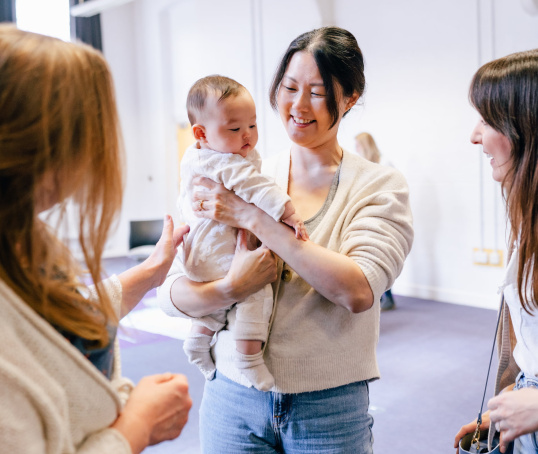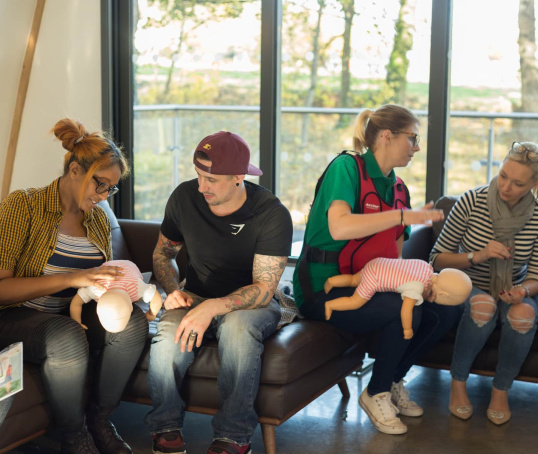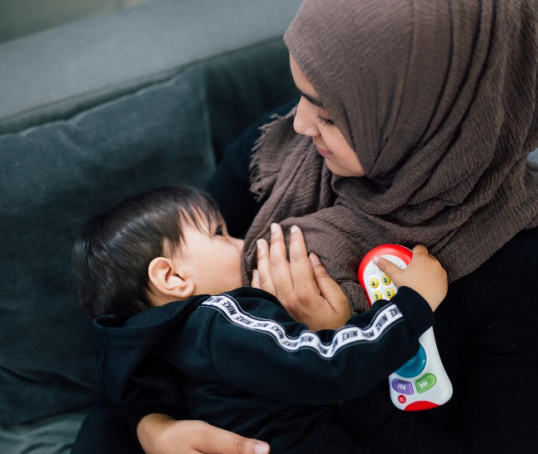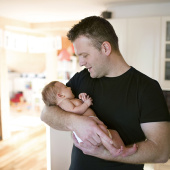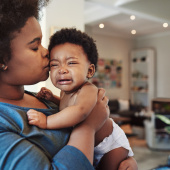If your baby seems to have become more clingy, it could be separation anxiety. Here we discuss the signs and how you can help your child and yourself.
What is separation anxiety?
Separation anxiety and fear of strangers is a normal developmental milestone. It can happen between the ages of six months and three years, and is most likely to start between eight months and a year. Some babies won’t experience it at all. Most move through this stage within a few weeks, while for others it can last up to school age (NHS, 2022; KidsHealth, 2023).
It happens when the baby realises how dependent they are on the people who care for them. As they become more aware of their surroundings, they feel less safe when they’re not around you (NHS, 2022).
For some babies, it might be triggered by a change in situation, such as moving house, a new nursery or childminder, or a new sibling (KidsHealth, 2023).
How can I help my child with separation anxiety?
It can be stressful and upsetting coping with a child who cries when you leave, but it’s very normal for your child to be upset when you go away. It might help to know that it’s a good sign of how strong your bond is. Some parents feel guilty about taking time away or going to work. But you’re also helping them to become more independent (NHS, 2022; KidsHealth, 2023).
If other family members, carers or people around you are distressed by your baby’s reaction you can assure them it’s normal healthy development.
There are some ways you can make it easier for you both (Action for Children, No date; NHS, 2022; KidsHealth, 2023; Psychology today, 2021).
- Help them feel secure by giving them lots of love and attention.
- Introduce the person who will be looking after your child with short practice separations from you first.
- Let them spend time together in a familiar place, such as your own house, while you are there. If your child is going to nursery, visit the nursery with your baby or child a few times before they start.
- Leave a comforting toy or blanket with them, or something to remind them of you.
- When you do leave them, don’t try to slip away without them noticing, or it may make it harder for you to leave them next time.
- Say goodbye in a positive but firm way, as they might get anxious if they see you upset. Keep goodbyes short.
- Tell them where you’re going and when you’ll be back in a way they understand, such as ‘after lunch.’
- Suggest something fun that you could do together when you’re back.
- Give them your full attention when you say goodbye.
- Don’t confuse them by coming back straight away after you’ve left.
- Try not to leave your baby with someone else when they are tired or hungry.
- Return at the time you told them, so they can trust you will come back when you say you will in future.
- Trust that whoever you’re leaving your baby with will be able to look after your child.
How can I help the child I’m looking after?
If the baby you’re looking after is experiencing separation anxiety, distract them with toys, songs or something fun when the person they’re attached to leaves (KidsHealth, 2023).
Reassure them by answering their questions about their attachment figure when they ask, before swiftly moving onto another toy or game (KidsHealth, 2023).
When does it become a cause for concern?
It’s normal for your child to feel upset when you leave. However you could talk to your health visitor or GP if (NHS, 2022; KidsHealth, 2023):
- Your child is excessively upset for their developmental age.
- They are very upset for a long time after you’ve left them.
- Their separation anxiety doesn’t improve after a few weeks.
- Trust your instincts that something may be wrong if your baby seems upset when going to a certain caregiver or babysitter and not others. This also may show up as them having trouble sleeping or not wanting to eat.
Further information
Our NCT Infant Feeding Line offers practical and emotional support with feeding your baby and general enquiries for parents, members and volunteers: 0300 330 0700.
We also offer NCT New Baby courses which are a great way for new parents to feel more confident.
Make friends with other parents-to-be and new parents in your local area and see what NCT activities are happening nearby.
Action for children (No date) How can I help my child with separation anxiety? https://parents.actionforchildren.org.uk/feelings-behaviour/understandi… [28 Aug 24]
KidsHealth (2023) Separation anxiety. https://kidshealth.org/en/parents/sep-anxiety.html [28 Aug 24]
NHS. (2022) Separation anxiety. https://www.nhs.uk/conditions/baby/babys-development/behaviour/separati… [28 Aug 24]
Psychology Today. (2021) Separation anxiety. https://www.psychologytoday.com/gb/conditions/separation-anxiety [28 Aug 24]

